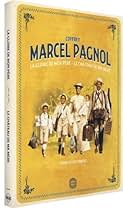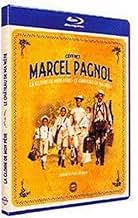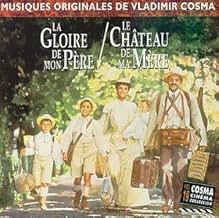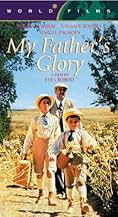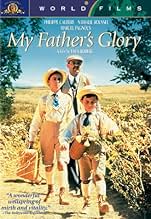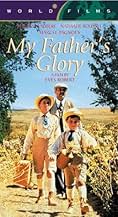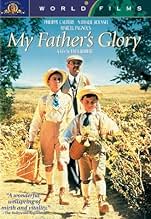IMDb RATING
7.6/10
7.5K
YOUR RATING
At the end of the nineteenth century, little Marcel lives with his parents in the Provence countryside. During his holiday, Marcel meets Lili, a local boy who knows all the secrets of the hi... Read allAt the end of the nineteenth century, little Marcel lives with his parents in the Provence countryside. During his holiday, Marcel meets Lili, a local boy who knows all the secrets of the hills, and the two become fast friends.At the end of the nineteenth century, little Marcel lives with his parents in the Provence countryside. During his holiday, Marcel meets Lili, a local boy who knows all the secrets of the hills, and the two become fast friends.
- Awards
- 2 wins & 5 nominations total
7.67.4K
1
2
3
4
5
6
7
8
9
10
Featured reviews
10eustfam
A must-see! One of the best I've ever watched!
The story is simple--it is about a young boy who spent his summers in the hills of Provence--yet it manages to tug the viewer at the heart. It is such a far cry from the families we see today who have no time to relate to each other. The boy's love for his father (and mother)clearly shines in this film.
The father is a school teacher, an atheist, and a republican. But he is a loving husband and a great father to his children. The mother is shy and affectionate and is sensitive the needs of her husband and children. So what makes this film such an enchanting experience? Since I am not a writer, I cannot really put into words the way I felt after watching this film. I know it left a smile in my heart...it also made me nostalgic for it reminded me of my own childhood. I wanted it to go on long after the movie ended. Watch it and you will know what I mean. It will take you back to the magical moments of growing up.
The father is a school teacher, an atheist, and a republican. But he is a loving husband and a great father to his children. The mother is shy and affectionate and is sensitive the needs of her husband and children. So what makes this film such an enchanting experience? Since I am not a writer, I cannot really put into words the way I felt after watching this film. I know it left a smile in my heart...it also made me nostalgic for it reminded me of my own childhood. I wanted it to go on long after the movie ended. Watch it and you will know what I mean. It will take you back to the magical moments of growing up.
Just beautiful!
This film is simply beautiful. Loaded with emotion. Marcel Pagnol's story as a kid growing up in Southern France.
This is a film I saw for the first time about 10 years ago. 10 years later, I enjoyed it even more. Yves Robert makes you care for characters. Philippe Caubère is brilliant as the father, who's a teacher. The truly beautiful Nathalie Roussel: the caring mother and wife. Young Julien Ciamaca gives a strong performance as Marcel. And what about Didier Pain: I just love his way of playing Oncle Jules.
Perhaps the greatest accomplishment of this movie is to make you travel to this part of the world, to make you feel that you're there when the story unfolds.
87/100 (***½)
Seen at home, in Toronto, on June 16th, 2002.
This is a film I saw for the first time about 10 years ago. 10 years later, I enjoyed it even more. Yves Robert makes you care for characters. Philippe Caubère is brilliant as the father, who's a teacher. The truly beautiful Nathalie Roussel: the caring mother and wife. Young Julien Ciamaca gives a strong performance as Marcel. And what about Didier Pain: I just love his way of playing Oncle Jules.
Perhaps the greatest accomplishment of this movie is to make you travel to this part of the world, to make you feel that you're there when the story unfolds.
87/100 (***½)
Seen at home, in Toronto, on June 16th, 2002.
Exquisite pastoral odyssey
This beautiful, charming work (and its companion MY MOTHER'S CASTLE) is lifted from the memoirs of filmmaker/screenwriter Marcel Pagnol.
It is a loving, romanticized recreation of Pagnol's childhood trips to the south of France.
Director Yves Robert ices every scene with sweet affection and a seemingly effortless attention to detail.
There are so many moving, heart-tugging scenes.
Describing them all would spoil the confection.
I'll mention one. Young Marcel accompanies his father, Joseph, a school teacher, to school one day. Not believing that Marcel can read already, Joseph writes a simple declaration of his love for Marcel on the blackboard. Marcel then surprises his father by reading out loud what his father wrote. It is such a touching, affecting scene.
MY FATHER'S GLORY is bursting to the seams with such magic.
Vladimir Cosma's score perfectly captures the period and tone of Pagnol's memories.
Simply exquisite.
It is a loving, romanticized recreation of Pagnol's childhood trips to the south of France.
Director Yves Robert ices every scene with sweet affection and a seemingly effortless attention to detail.
There are so many moving, heart-tugging scenes.
Describing them all would spoil the confection.
I'll mention one. Young Marcel accompanies his father, Joseph, a school teacher, to school one day. Not believing that Marcel can read already, Joseph writes a simple declaration of his love for Marcel on the blackboard. Marcel then surprises his father by reading out loud what his father wrote. It is such a touching, affecting scene.
MY FATHER'S GLORY is bursting to the seams with such magic.
Vladimir Cosma's score perfectly captures the period and tone of Pagnol's memories.
Simply exquisite.
Enchanting childhood nostalgia
This is a movie for those who enjoy magic and nostalgia while floating away in childhood memories. It is the calm and enchanting story of the adventures of Marcel Pagnol. Julien Ciamaca does an outstanding job, he is handsome, naive and buoyant. The landscape and the narrative style make this movie, at least in my eyes, a real masterpiece. The entire story is full of nostalgia and deals with Marcel's very own perception of life. His friendship with Lili is honestly depicted and wonderfully staged. The boys do a great job, indeed. It is a tale that takes you back to contemporary France and revives the summer in the Provence region, a summer full of innocent joy and adventures. Inspiring and well-acted, the setting is beautiful and the music just perfect. All characters are well cast.
Don't Forget The Companion Piece
This, like "Jean de Florette" and "Manon Of The Spring" is the first of two French films that go together. The second part of this story is the film, "My Mother's Castle." See them both, but if you can only see one, my recommendation is "My Mother's Castle."
As in many French films, this offers very little action and not much that is noteworthy but is filled with interesting characters and excellent storytelling. The French still offer that great storytelling, something that has slowly faded among filmmakers in other countries.
This story is based on the memoirs of Marcel Pagnol, a very Liberal educator and atheist. His views are probably the main reason critics all loved this movie. They could identify.
Despite the father's shortcomings, there is a nice appeal here as all the characters are interesting to varying degrees. I love the way they all express themselves, certainly different than we do here in North America. As with most of these French stories, there is very little profanity, too.
As in many French films, this offers very little action and not much that is noteworthy but is filled with interesting characters and excellent storytelling. The French still offer that great storytelling, something that has slowly faded among filmmakers in other countries.
This story is based on the memoirs of Marcel Pagnol, a very Liberal educator and atheist. His views are probably the main reason critics all loved this movie. They could identify.
Despite the father's shortcomings, there is a nice appeal here as all the characters are interesting to varying degrees. I love the way they all express themselves, certainly different than we do here in North America. As with most of these French stories, there is very little profanity, too.
Did you know
- Trivia'La Gloire de mon père', published in France in 1957, is the first volume of four autobiographical novels by Marcel Pagnol. The second volume, 'Le château de ma mere', was published in 1958. In the novels, Marcel's meeting Lili takes place in volume two, as does Marcel's decision to stay at Provence as a hermit. The two novels were translated into English and published by Doubleday (in the U.S) as a single book in 1960 under the title 'The Days Were Too Short', This translation was reprinted by North Point Press as a single book titled 'My Father's Glory / and / My Mother's Castle' in 1986.
- GoofsOn the family's holiday, each time that it is raining the sky is bright and without a cloud (except the scene with the storm).
- Quotes
Augustine: You need your gun to go shopping?
Joseph Pagnol: You never know.
- How long is My Father's Glory?Powered by Alexa
Details
- Release date
- Country of origin
- Languages
- Also known as
- Der Ruhm meines Vaters
- Filming locations
- Signes, Var, France(bird hunting party)
- Production companies
- See more company credits at IMDbPro
Box office
- Gross US & Canada
- $1,730,856
- Gross worldwide
- $1,730,856
- Runtime
- 1h 45m(105 min)
- Color
- Aspect ratio
- 1.85 : 1
Contribute to this page
Suggest an edit or add missing content

![Watch Bande-annonce [OV]](https://m.media-amazon.com/images/M/MV5BNjNlYzQ0NGQtODdlNS00YzRmLTlhYzQtZDdiOTNiZDZlYWYzXkEyXkFqcGdeQXRyYW5zY29kZS13b3JrZmxvdw@@._V1_QL75_UX500_CR0)

